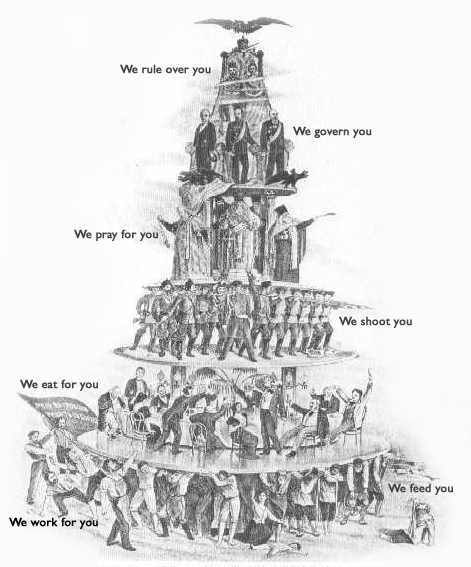Liberty Matters
The Role of Institutional Analysis in a Libertarian Theory of Class

In this comment I wish to expand on a point I made previously. I maintain that there is a significant difference between the class analysis typically found in the writings of mainstream classical liberals and the class analysis developed by the more radical liberals—or what today we call “libertarians.” When mainstream classical liberals attacked the exploitative behavior of a ruling class, they usually had in mind a social class that had ensconced itself in government and was using state power for nefarious, self-interested purposes. This critique did not target the state itself, however, which if confined to its legitimate functions--basically, the enforcement of individual rights and protection against foreign aggressors—would not be exploitative. The problem, in their view, lay not in the institution of government itself but in how that institution is used.
In contrast, radical liberals (such as Thomas Hodgskin) viewed the state itself as the ultimate source of exploitation. The activities of the state are inherently unjust, regardless of who is in power and what their intentions may be. Members of the state, especially those in high positions of authority, become part of the ruling class in virtue of their relationship to the institution known as the state. In this view, the state taints the people who work for it, not vice versa. Anyone who controls the reins of political power or who reaps significant benefits from that power is a member of the ruling class, regardless of his or her social or economic status.
The radical liberal (libertarian) view of class analysis depends on an institutional analysis of the state; but, with one exception, I know of no early libertarians who attempted to develop this kind of analysis in detail. The exception is Herbert Spencer, especially in his sociological writings about the rapid growth of bureaucracy in the modern state. As I noted in one of my essays on Spencer for Libertarianism.org, Spencer “called attention to the development of entrenched bureaucracies that take on a life of their own, become politically autonomous, and control vast areas of social and economic activities.”[66]
Spencer anticipated some of Max Weber’s observations about the key role played by bureaucracies in maintaining and expanding state power. Weber wrote:
Once fully established, bureaucracy is among those social structures which are the hardest to destroy. [A]s an instrument of rationally organizing authority relations, bureaucracy was and is a power instrument of the first order for one who controls the bureaucratic apparatus….Where administration has been completely bureaucratized, the resulting system of domination is practically indestructible.[67]
Weber went on to observe that a state bureaucrat “is entrusted with specialized tasks, and normally the mechanism cannot be put into motion or arrested by him, but only from the very top. The individual bureaucrat is, above all, forged to the common interest of all the functionaries in the perpetuation of the apparatus and the persistence of its rationally organized domination."[68]
Weber’s remarks point to an essential element of an institutional analysis of the state, namely, that anyone who fills a role in a state bureaucracy furthers the interests of that institution, regardless of what that person’s intentions and values may be.
The highly specialized functions in the modern state generate the need for a division of labor. This division of labor is not spontaneous, as we find in the social sphere of voluntary interaction. Rather, specific tasks are designed to further the purposes of the state, which is itself a designed institution. (The primary purpose of the modern state, as Weber and other sociologists have argued, is to maintain territorial sovereignty.) This means that any person who fulfills the role assigned to him in a bureaucracy furthers the purposes of the state, regardless of what his intentions may be. Suppose a rabid anarchist, who declares his eternal hostility to the state, works for a government bureaucracy. Even that anarchist would advance the interests and purposes of the state, however unintentionally, insofar as he fulfills the requirements of his role, i.e., so long as he does his job. The personal values and beliefs of the anarchist are irrelevant; he will be contributing to the interests of the state, even if he has no desire to do so and took his job only to make a living. He will have made himself a member of the ruling class, objectively considered. (There are obvious degrees of participation and responsibility, but I cannot explore that issue here.)
My explanation of institutional analysis, however sketchy and inadequate, is what I think radical liberals had in mind when they condemned the state per se as the foundation of an exploitative ruling class. In Marxian terms, this is an objective theory of class because it does not depend on the subjective beliefs and intentions of individuals. Moreover, as I noted previously, this class theory is neutral in regard to the social and economic status of individuals. Even if positions of power are filled exclusively by escaped slaves, they would become members of the ruling class in virtue of their institutional roles within the state.
Endnotes
[66.] “From Optimism to Pessimism: The Case of Herbert Spencer, Part 6,” at: https://www.libertarianism.org/publications/essays/excursions/optimism-pessimism-case-herbert-spencer-part-6
[67.] Max Weber, Economy and Society: An Outline of Interpretive Sociology, ed. Guenther Roth and Claus Wittich (Berkeley: University of California Press, 1968), II: 987.
[68.] Ibid., II: 987-88.
Copyright and Fair Use Statement
“Liberty Matters” is the copyright of Liberty Fund, Inc. This material is put on line to further the educational goals of Liberty Fund, Inc. These essays and responses may be quoted and otherwise used under “fair use” provisions for educational and academic purposes. To reprint these essays in course booklets requires the prior permission of Liberty Fund, Inc. Please contact oll@libertyfund.org if you have any questions.